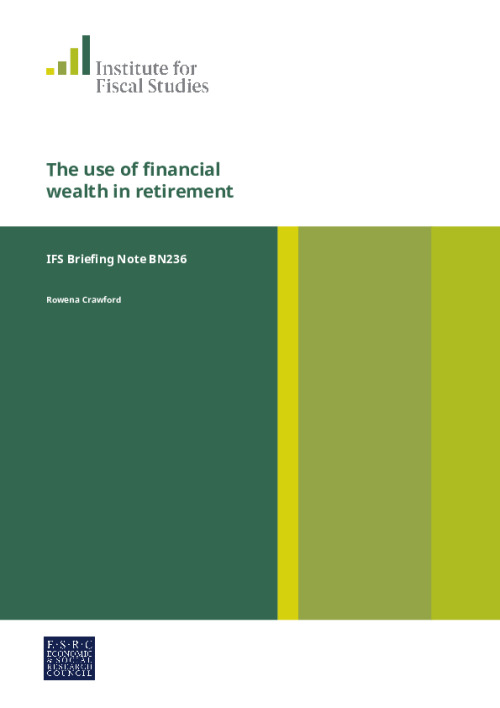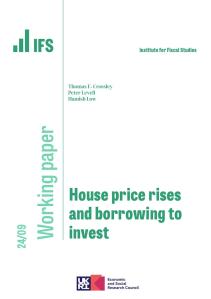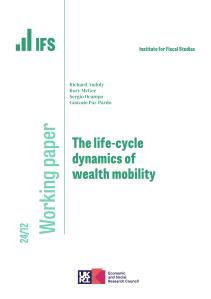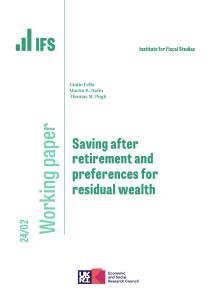In this briefing note, we examine how individuals’ financial wealth evolves as they age through retirement. We do so using data from the English Longitudinal Study of Ageing – a large-scale survey of the private household population of England aged 50 and over, that has interviewed the same individuals every two years since 2002–03. We can therefore examine changes in wealth for the same individuals over time (for up to 12 years) and examine how changes in wealth vary according to individuals’ characteristics.
These findings have implications for the debate around the adequacy of younger generations’ accumulation of resources, both directly (through the inheritances they are likely to receive) and indirectly (through how concerned we are about younger generations not accumulating as much wealth as previous generations).
Going forwards, it will be important to continue to assess how individuals’ use of wealth in retirement evolves, both as the freedom to access accumulated pension wealth becomes more established and as younger generations reach retirement with different portfolio compositions and likely smaller overall levels of resources.
Key findings:
Financial wealth is, on average, drawn down only slowly.
Over the 12-year period 2002–03 to 2014–15, among those born in 1930–34 (who aged from 69 to 81 on average), median real net financial wealth declined by 14%. Among those born in 1925–29 (who aged from 74 to 86 on average), it declined by 13%. And for those born in 1920–24 (who aged from 79 to 91 on average), it declined by just 1%. In each case, these declines in financial wealth are slower than the fall in remaining life expectancy. In other words, each cohort’s average financial wealth per expected year of remaining life increased with age.
Current patterns of behaviour suggest that, on average, net financial wealth may decline by less than 31% between ages 70 and 90.
If the rate of drawdown at a given age does not differ between generations, observed behaviour over the 2002–03 to 2014–15 period suggests that, on average, real net financial wealth is drawn down by 17% between ages 70 and 80 and by 31% between ages 70 and 90. This suggests that the majority of financial wealth held by retired generations is likely to be bequeathed, rather than used to fund consumption in retirement.
The rate of drawdown of financial wealth is greater among those with higher levels of wealth.
Recent behaviour suggests a reduction in wealth of 39% on average between ages 70 and 90 among the wealthiest half of individuals, and a decline of 13% on average among the least wealthy half.
We cannot say whether this slow decline in financial wealth represents ‘optimal’ behaviour.
We cannot say whether individuals are making the correct trade-off between their consumption in retirement, saving to cover the risk of unexpected expenses, and the bequests they leave on death (all of which are presumably valued to some extent), or whether there are some constraints (such as imperfect information, limited numerical ability or poor financial acuity) that is causing individuals to make poor decisions.
There are systematic differences in the rate at which financial wealth is drawn down according to individuals’ characteristics and circumstances.
Financial wealth, income, owner-occupation, holding other property wealth, numeracy, health and expectations of future long-term care expenses are all associated with the rate at which financial wealth declines in retirement. This suggests that precautionary saving, bequest motives and financial acuity may all play a role in individuals’ choices.
Greater financial resources are associated with lower rates of financial wealth drawdown.
Estimates suggest that (all else equal) each additional £10,000 of financial wealth is associated with a 1 percentage point greater decline in wealth over six years. Individuals with higher incomes on average spent their financial wealth less rapidly – an additional £1,000 per year is associated with a 0.2 percentage point smaller decrease in wealth over six years. We also find that those with property wealth other than a primary residence use their financial wealth less rapidly than those without (for a given level of financial wealth).
Expectations of paying for social care in future are associated with a slower rate of wealth drawdown.
Those reporting zero chance of having to pay for long-term care in future saw a 14 percentage point greater decline in their wealth, on average, than those reporting a 1–49% chance. Those reporting a 50% or greater chance saw, on average, a 4 percentage point smaller fall in their financial wealth than those reporting a 1–49% chance. We cannot prove this is a causal relationship, but these results lend more support to the idea that, on average, individuals are holding on to their wealth in order to pay for social care, than to the idea that individuals are spending down their wealth in order to be eligible for state support.










